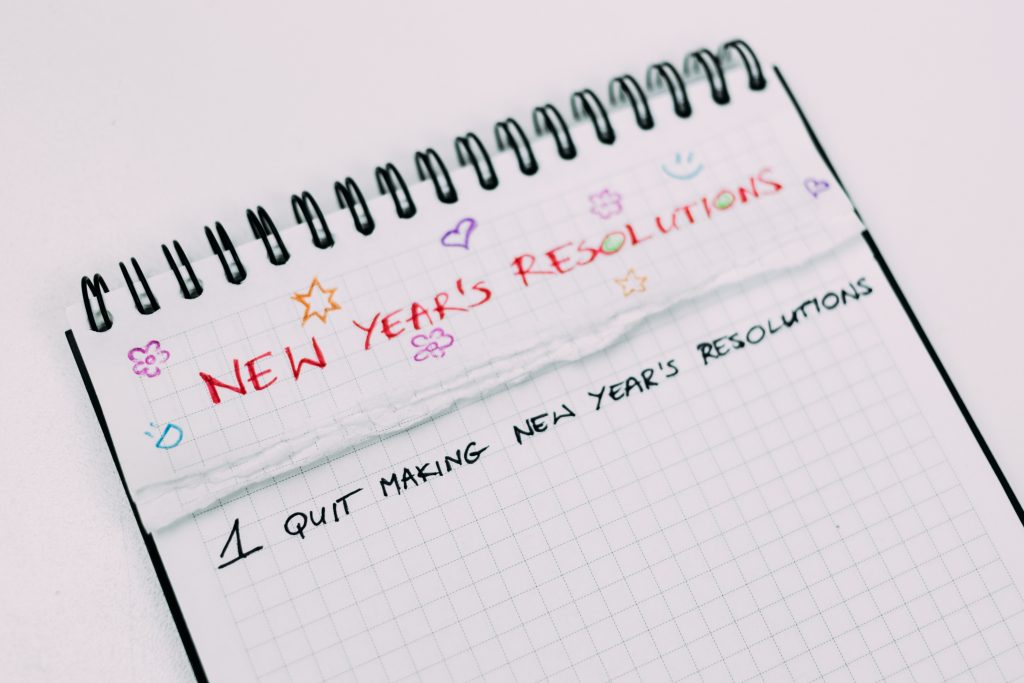New year’s resolutions…and how to actually stick to them!
A new year, a fresh start!
After a well-deserved break and with enough time to think about last year’s achievements, you start off the new year with a clean slate.
That paper really needs to be published as soon as possible, you finally have to start networking, you want to learn how to use R, be less distracted by other things in your home-office, and you definitely want to impress everyone with a great talk at an important conference.
Sounds great! However, the thing about New Year’s resolutions is: most people can’t stick to them. By the time February comes around, chances are that you have already given up. Here are some tips to help you stick to your New Year’s resolutions:

One goal at a time
Don’t make a list of goals that you try to achieve all at the same time. You may be an intelligent soul, however, we humans are just simple creatures. People are most productive when they focus on 1 or 2 priorities, instead of a whole list. So, focus on one thing, finish it, and then go on to the next. That way, you are more likely to succeed.
A (wo)man with a plan
It’s called a goal, not a dream. Your goal should be reachable and realistic. Define the goal and steps needed to reach the goal. Make it SMART:
- Specific
- Measurable
- Achievable
- Relevant
- Time-bound
Example
Goal: you want to learn more about data visualisation so you can use it in your articles.
SMART goal: I will attend at least 1 course in 2021, to learn more about data visualisation. I will make a list of possible courses by February 1st, in order to meet my goal in time.
See how your goal comes to life by making it SMART? I bet you are more dedicated to achieving your goal now that you have these specifics parameters.

Make it a habit
It’s all about creating good habits – and that takes time. If you want to finish the paper you have been working on for ages but keep getting distracted, make it a habit not to check your email in the morning. That way, you can stay focused on your long-term goal. Try this for at least 2 months and it will feel like you have never done it any differently before.
Reward yourself
Yes, you are an adult and it might seem silly dangling a carrot in front of your own nose, but it works. So reward yourself with something nice. Just a note: if your goal is to stay more focused, don’t reward yourself with indulging in an hour-long Reddit rabbit hole, but rather with something completely unrelated to the resolution. Perhaps pick up a nice meal at your favorite restaurant instead.
Support network
Tell your colleagues, friends, and family about your intentions so they can support you. They might be able to give you a pep talk when you are down, some tough love when you are slacking, or maybe they will even join your efforts.
Tips & Tricks
Don’t invent the wheel yourself. Not knowing how to do something might leave you postponing it endlessly. Luckily for you, there are always tips & tricks that can help you out. Looking for tips on how to create a virtual poster? Or to record a short talk no one will forget? Or how to avoid awkward silences during networking? We’ve got you covered!
Possible New Year’s Resolutions
If the pandemic has worn you out and you are feeling pretty apathetic about your research, your job or your life, these possible New Year’s Resolutions might help get you off the couch.
Become more focused at work
Home-office life is hard on everyone, but there are things you can do to become more focused. First, you need to examine why you are distracted easily. That way you can define your SMART goal.
If you check your email all the time, set a goal not to check your mail until 1 pm every day. Or if your workspace is a mess, try to create a more peaceful environment. Or maybe you aren’t focuse, because you don’t have an overview of what needs to be done. Try making a structured plan with a timeline. If stress is the underlying problem, try meditating or sign up for mindfulness.

Make yourself more visible
Showing off your skills and potential doesn’t come naturally to everyone. For most people, it is hard work making themselves and their research visible.
Networking: A goal for this year can be to have at least 5 network conversations with people in your research field. Update your LinkedIn profile, join networking activities and schedule meetings with relevant people. Don’t know how to start? Take a look at these tips from EMBLs career advisor.
Presenting at a conference: Making yourself visible by giving a short talk or a poster presentation would also be a great goal. If you are going to present a virtual poster, these tips might help you out. Have you been selected for a flash talk? Don’t take this lightly and prepare yourself using these tips.
Gaining skills or knowledge
A good researcher always tries to keep up with the newest insights. Read the latest articles, get relevant newsletters, and follow relevant accounts on Twitter. But sometimes you need to step up your game a little – apply for a course, join a conference, or take training in personal effectiveness or leadership.
Subscribe to our newsletter to be the first to know about new conferences and courses.
Do you have New Year’s Resolutions? We are curious to know about them. Drop us a message or a Tweet.